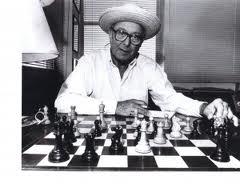
Beginner Mating Patterns Redux - Part 3
In my first article on beginner mating patterns, we explored Back Rank mates, Queen mates on h7, Queen mates on g7 (while also discussing general dark-square weaknesses around f6, g7, h6, and even h8), and smothered mates. In the second article we took a look at Scholar’s Mate (the weakness of the f7-square/pawn) and Fool’s Mate (weakness along the h5-e8 diagonal). I also pointed out the dangers of leaving one's King in the center for too long.
Though I say “beginner’s” patterns, the fact is these basic patterns are the building blocks to far more complex mating/attacking situations. In other words, they are equally important to every rating group.
In our third and final discussion on those particular patterns, you get to try your luck at lots and lots of puzzles. These will either ram home the points made in parts one and two, prove that you are a master of these patterns, or simply bring a smile to your face as you watch the tactical magic unfold.
As always, please look at comments and/or notes after you try to solve each puzzle (yes, there ARE comments and notes hiding under most puzzles!).
About 7 years later I found myself in an interesting situation. I was paired with Mr. Denker at one of the legendary Lone Pine events. I was, of course, delighted to play him, and though he was a thousand years old and I was 21, he systematically outplayed me and achieved a dead won position. However, he overlooked a 3-time repetition (it was hard to see since the 3 reps happened over a large amount of moves). When I called Kashdan (the tournament director) over, said I was going to repeat the position for the 3rd time with my next move and thus claim the draw, Denker said, “He’s lying Kash! He’s lying!”
Kashdan, in true professional style said, “Okay Arnold” and walked away! I had to physically drag Kashdan back to the board and demonstrate each rep before he finally accepted reality.
Over subsequent years, I played Denker four more times. One game was drawn, and I won the other three (okay, at that point he was one thousand and five years old). In one of my wins he made a move, let the piece go, realized it was an error, and then moved something else! In another game, he repeatedly kicked me under the table!
This guy was a hardcore competitor, but he was a real gentleman away from the board. In any case, I still cherish Denker’s book, and have used some of the examples there for various puzzles. Denker’s If You Must Play Chess can still be found at used bookstores and is well worth buying! The games and notes are exciting, charming, and instructive.






